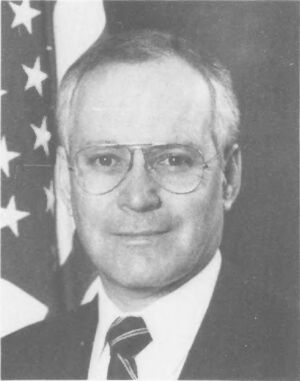Maynard Glitman
( diplomat) | |
|---|---|
 | |
| Born | 1933-12-08 Chicago, Illinois |
| Died | 2010-12-13 (Age 77) |
| Nationality | US |
| Alma mater | • University of Illinois • Fletcher School of Law and Diplomacy |
Nuclear negotiation expert. Spoke on The Arms Control Debate at the 1987 Bilderberg.
| |
Maynard Wayne Glitman was an American diplomat. He spoke at the 1987 Bilderberg on The Arms Control Debate.
Glitman was part of the team that negotiated the Intermediate-Range Nuclear Forces Treaty in 1987. Later, Glitman served as the United States Ambassador to Belgium 1988–1991.[1]
Early Life
Glitman was born in Chicago, Illinois on Dec. 8, 1933 to Reada and Ben Glitman. Mike earned a bachelor's degree with highest honors from the University of Illinois in 1955, where he was a member of Phi Beta Kappa. He later completed a master's degree in 1956, from the Tufts University, Fletcher School of Law and Diplomacy.
Career
Glitman attended the University of Illinois and the Fletcher School and was conscripted to the United States Army in 1957. Afterward, he joined the US Foreign Service. There he was employed in the international financial affairs department. From 1956 to 1958, Glitman was accredited as an economic attaché to the US Mission in Nassau, Bahamas
He worked in property surveillance from 1959 to 1961 and was accredited in the Commerce Department of the US Mission in Ottawa. From 1961 to 1965 he worked on tasks in the field of trade relations under the US Ambassador William Walton Butterworth and received further training in business administration at the University of California, Berkeley.
In 1965 he was assigned to the Canadian affairs in Washington. From 1965 to 1966 he worked as a civil servant in the economic department on banking issues and advised the US government's office to the United Nations under Arthur Goldberg on economic issues.
From 1967 to 1968 he dealt with the Six Day War and the question of the recognition of Taiwan. In the National Security Council, he advised on business and Western Europe. From 1968 to 1973 was accredited at the embassy in Paris with Arthur K. Watson and was involved with Henry Kissinger in the Paris peace negotiations for the Vietnam War.
His area of responsibility included tasks for NATO and overflight rights for the Lockheed U-2. From 1973 to 1976 he advised the US government on foreign trade policy in Washington. He was promoted to Deputy Undersecretary and advised on price developments in the oil market. He moved to the Department of Defense and became Deputy Assistant to the Secretary of Defense and was Deputy Chief of Mission at NATO Headquarters in Brussels from 1976 to 1977.
From 1977 to 1981 he was in Geneva with tasks in the areas of the Red Army, North Atlantic Council, Organization for Security and Cooperation in Europe long-term defense strategies and the Nuclear Non-Proliferation Treaty under Ambassador William Tapley Bennett in negotiations with the Soviet Union. From 1981 to 1984 he acted as Paul Nitze's deputy in the negotiations for the INF agreement.
In 1981, he became intensely involved in Arms Control issues as the Deputy Chief negotiator in the Intermediate-Range Nuclear Forces negotiation (INF agreement) in Geneva, Switzerland.
During the hiatus in the talks caused by the walk out of the Soviet delegation, he was posted to Vienna, Austria where he was the Chief United States Representative, to the Mutual and Balanced Force Reduction Negotiations. When the INF talks resumed six months later, President Reagan called him to return to Geneva and lead the delegation in renewed talks with the Soviet Union.
Glitman was involved in the forest walk compromise between Nitze and Soviet diplomat Juli Kwizinski in the summer of 1982.
During the Korean Airlines flight 007 situation, Glitman was an executive at NATO headquarters.
The talks successfully concluded in 1987, when the U.S. Senate ratified the INF treaty eliminating an entire class of nuclear weapons, a significant achievement in the ending of the Cold War. His last posting as Ambassador to the Kingdom of Belgium concluded a long and successful career.[2]
Awards
In recognition of his work, he was awarded the Presidential Distinguished Public Service Award in 1989 and Presidential Meritorious Public Service Award in 1987 and 1984. The Department of Defense awarded him the Outstanding Public Service Medal in 1980 and its Meritorious Public Service Medal in 1977.
After retiring from the Foreign Service, Ambassador Glitman wrote articles for many foreign affairs publications, served as diplomat in residence and an adjunct political science professor at the University of Vermont.
Event Participated in
| Event | Start | End | Location(s) | Description |
|---|---|---|---|---|
| Bilderberg/1987 | 24 April 1987 | 26 April 1987 | Italy Cernobbio | 35th Bilderberg, in Italy, 106 participants |